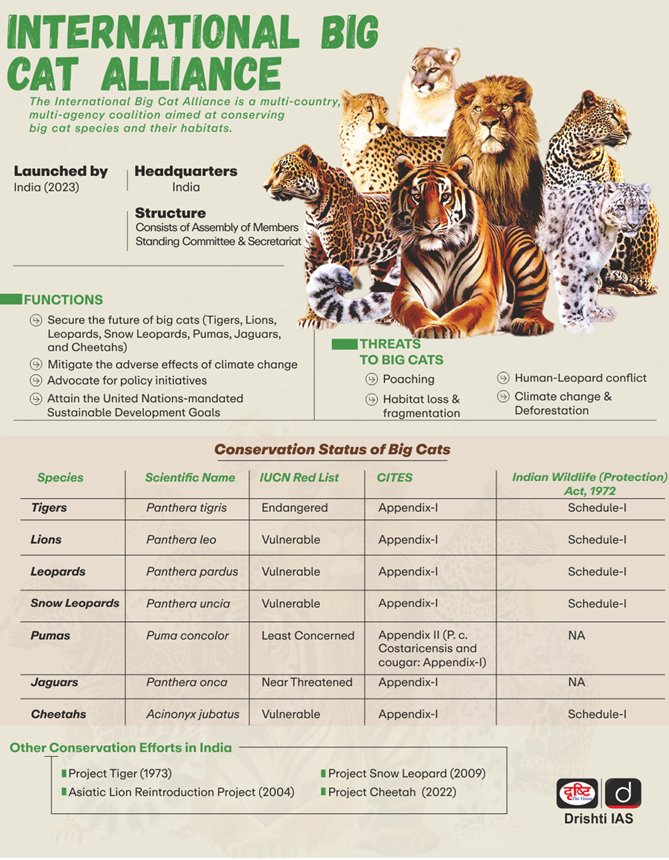Important Facts For Prelims
India Pushes Big Cat Conservation at CoP30
- 21 Nov 2025
- 6 min read
Why in News?
India, at the High-Level Ministerial Segment on the International Big Cat Alliance (IBCA) during United Nations Climate Change Conference (UNFCCC) Conference of Parties (CoP30) in Belém, Brazil called for stronger global cooperation to protect big cats.
- India will host the Global Big Cats Summit in New Delhi in 2026.
- India also released ‘One Earth, One Family, One Future: A Decade of Climate Action’, summarising progress in mitigation, adaptation and climate finance, and outlining the pathway to a Viksit and Sustainable Bharat 2047.
Why are Big Cats Important for Climate and Biodiversity?
- Apex Predators: They regulate prey populations and maintain ecological balance across forests and grasslands.
- Healthy predator–prey dynamics improve ecosystem resilience to climate change, droughts and habitat degradation.
- Ecosystem Health Indicators: Thriving big cat populations reflect healthy forests, regenerating grasslands and functioning watershed systems.
- Nature-Based Climate Solutions: Big cat landscapes store carbon, support natural regeneration and strengthen long-term climate mitigation efforts, making them important Nature-Based Climate Solutions.
- Conserving big cats safeguards carbon sinks, water security, biodiversity and soil stability, which are the key components of climate and ecological health.
What are the Key Facts About the International Big Cat Alliance (IBCA)?
- IBCA: It is India led multi-country, multi-agency coalition that brings together 95 big cat range countries, non-range nations interested in conservation, global conservation partners, and scientific organisations involved in big cat research, creating a unified platform for collaborative action and knowledge sharing.
- Launched by India in 2023 during the 50 years of Project Tiger, IBCA was later approved by the Union Cabinet with its Secretariat headquartered in India.
- IBCA was established through the National Tiger Conservation Authority (NTCA) under the Ministry of Environment, Forest & Climate Change (MoEFCC).
- Species Covered: IBCA aimed at conserving seven big cats (Tiger, Lion, Leopard, Snow Leopard, Cheetah, Jaguar, Puma). India hosts 5 of the 7 (Puma and Jaguar are not found in India).
- Objective: To curb illegal wildlife trade, conserve natural habitats, mobilise financial and technical resources, mitigate climate change impacts on big cats.
- Membership: It is open to all UN member countries, range countries where these big cats naturally occur, and non-range countries willing to support global big cat conservation.
- Funding: India has committed Rs. 150 crore (2023-2028) in support to the IBCA and is exploring additional funding through bilateral, multilateral, and donor organizations.
- Significance: It provides a unified global platform for big cat conservation.
- Enhances cooperation, capacity-building, south–south collaboration, and technology exchange.
- IBAC supports ecosystem resilience, carbon storage, and climate change mitigation through Nature-Based Climate Solutions.
Frequently Asked Questions (FAQs)
1.What is the International Big Cat Alliance (IBCA)?
IBCA is a multi-country, multi-agency coalition launched by India to conserve seven big cats (Tiger, Lion, Leopard, Snow Leopard, Cheetah, Jaguar, Puma), promote best practices, provide technical support and mobilise finance for range countries.
2. Which species and how many countries are associated with IBCA?
IBCA covers seven big cat species (Tiger, Lion, Leopard, Snow Leopard, Cheetah, Jaguar, Puma) and brings together 95 big-cat range countries along with non-range nations, scientific organisations, NGOs and private partners for coordinated conservation action.
3. How do big cats contribute to climate mitigation?
Big cats indicate healthy ecosystems; conserving their habitats preserves forests and grasslands that act as carbon sinks, protect watersheds and enhance ecosystem resilience.
UPSC Civil Services Examination Previous Year Question (PYQ)
Q. Consider the following statements: (2019)
- Asiatic lion is naturally found in India only.
- Double-humped camel is naturally found in India only.
- One-horned rhinoceros is naturally found in India only.
Which of the statements given above is/are correct?
(a) 1 only
(b) 2 only
(c) 1 and 3 only
(d) 1, 2 and 3
Ans: (a)
Q. Consider the following statements: (2024)
- Lions do not have a particular breeding season.
- Unlike most other big cats, cheetahs do not roar.
- Unlike male lions, male leopards do not proclaim their territory by scent marking.
Which of the statements given above are correct ?
(a) 1 and 2 only
(b) 2 and 3 only
(c) 1 and 3 only
(d) 1, 2 and 2
Ans: (a)
Q. Consider the following: (2012)
- Black-necked crane
- Cheetah
- Flying squirrel
- Snow leopard
Which of the above are naturally found in India?
(a) 1, 2 and 3 only
(b) 1, 3 and 4 only
(c) 2 and 4 only
(d) 1, 2, 3 and 4
Ans: (b)







